
The 5p fee for plastic carrier bags in England will be doubled to 10p, and extended to all shops, under plans set out by the environment secretary.
The change is contained in a government consultation aimed at further reducing the plastic used by consumers and could come into effect in January 2020.
Smaller retailers, who are exempt from the current levy, supply an estimated 3.6 billion single-use bags annually.
Schools in England are also being told to eliminate unnecessary plastic.
Education Secretary Damian Hinds is urging school leaders to replace items such as plastic straws, bottles and food packaging with sustainable alternatives by 2022.
In August, Theresa May promised there would be a consultation on changes to the plastic bag levy.
Environment Secretary Michael Gove said: "We want to do even more to protect our precious planet and today's announcement will accelerate further behaviour change and build on the success of the existing charge."
Since the 5p fee was introduced in 2015 for retailers with at least 250 employees, an estimated 15 billion bags have been taken out of circulation.
Trade bodies representing about 40,000 small retailers have launched a voluntary approach to a 5p charge, but this accounts for less than one-fifth of companies likely to be affected by the proposed changes.
by Roger Harrabin, BBC environment analyst
The government wavered for years before imposing a plastic bag tax for England - but the result of the policy eventually introduced is crystal clear: taxes change behaviour.
People who previously thought nothing of carting home their supermarket shopping in half a dozen flimsy plastic bags seem appalled by the prospect of a 30p charge, and dig into their handbags for nylon bags instead.
A similar shift in behaviour will surely be seen now in local stores, although the change may be less marked because people tend to buy smaller quantities from corner shops, so may be willing to pay an extra 10p for convenience.
It's also possible that these convenience store bags disproportionately harm the environment because they're used by people picking up snacks while visiting beauty spots or beaches.
The announcement of a consultation on an increased charge is part of a broader move towards environmental taxation - an issue which can easily cause governments trouble if they don't protect the poorest from the impact of the taxes.
In Scotland, Wales and Northern Ireland, all retailers - including smaller shops - already charge a minimum of 5p for plastic bags.
The Marine Conservation Society says the levies have had an impact on reducing plastic waste on beaches and in the sea.
Oceanographer Laura Foster, head of Clean Seas at the MCS, said: "We are able to measure the impact of legislation and we've seen that since the introduction of the plastic bag charge in the UK the amount we find on the beaches has gone down.
"That's also been replicated by studies that have been done offshore. They've also seen a reduction in the amount of plastic bags they find."
While retailers are given the choice on what to do with the money consumers pay for plastic bags, they are expected to give it to good causes. According to Defra, an estimated £51m was donated in 2017-18.

The Association of Convenience Stores, which is backing Defra's plans, says about half of the small shops it represents in England are currently charging for plastic bags.
ACS chief executive James Lowman said: "This has been shown to be highly effective at reducing waste, whilst also raising money for local, national and environmental charities."